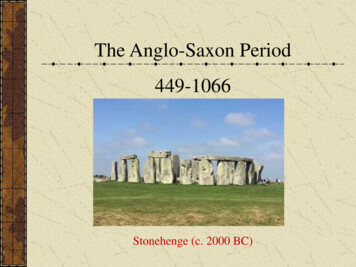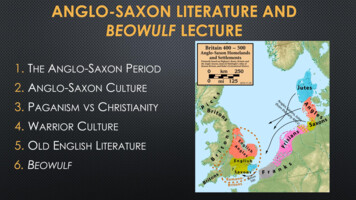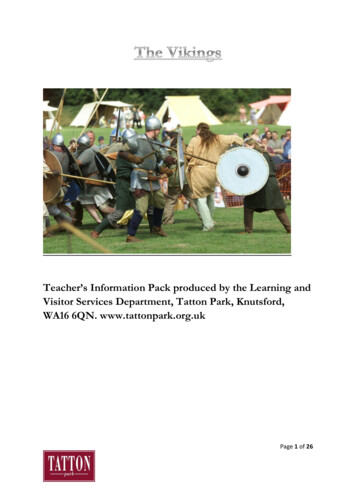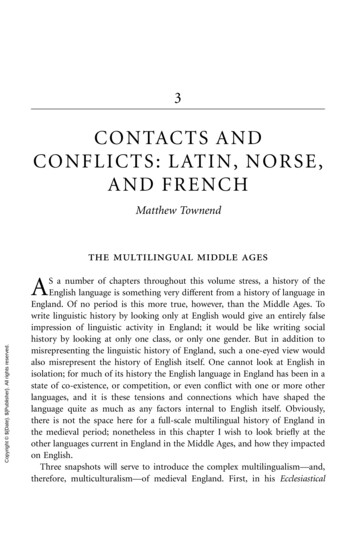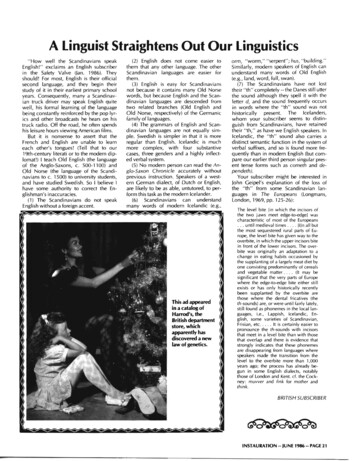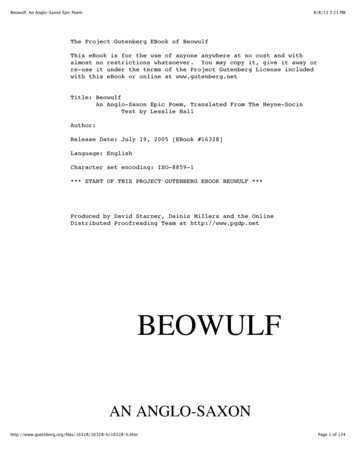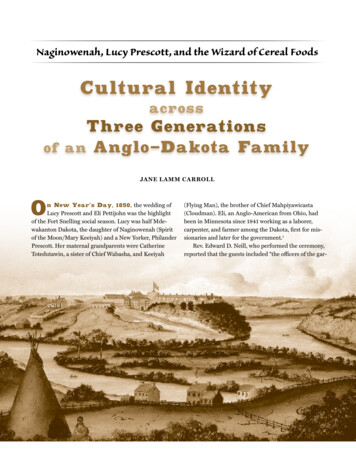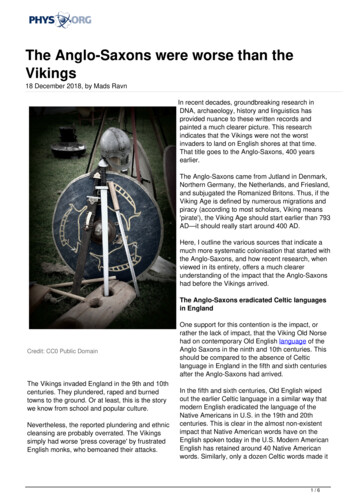
Transcription
The Anglo-Saxons were worse than theVikings18 December 2018, by Mads RavnIn recent decades, groundbreaking research inDNA, archaeology, history and linguistics hasprovided nuance to these written records andpainted a much clearer picture. This researchindicates that the Vikings were not the worstinvaders to land on English shores at that time.That title goes to the Anglo-Saxons, 400 yearsearlier.The Anglo-Saxons came from Jutland in Denmark,Northern Germany, the Netherlands, and Friesland,and subjugated the Romanized Britons. Thus, if theViking Age is defined by numerous migrations andpiracy (according to most scholars, Viking means'pirate'), the Viking Age should start earlier than 793AD—it should really start around 400 AD.Here, I outline the various sources that indicate amuch more systematic colonisation that started withthe Anglo-Saxons, and how recent research, whenviewed in its entirety, offers a much clearerunderstanding of the impact that the Anglo-Saxonshad before the Vikings arrived.The Anglo-Saxons eradicated Celtic languagesin EnglandCredit: CC0 Public DomainThe Vikings invaded England in the 9th and 10thcenturies. They plundered, raped and burnedtowns to the ground. Or at least, this is the storywe know from school and popular culture.Nevertheless, the reported plundering and ethniccleansing are probably overrated. The Vikingssimply had worse 'press coverage' by frustratedEnglish monks, who bemoaned their attacks.One support for this contention is the impact, orrather the lack of impact, that the Viking Old Norsehad on contemporary Old English language of theAnglo Saxons in the ninth and 10th centuries. Thisshould be compared to the absence of Celticlanguage in England in the fifth and sixth centuriesafter the Anglo-Saxons had arrived.In the fifth and sixth centuries, Old English wipedout the earlier Celtic language in a similar way thatmodern English eradicated the language of theNative Americans in U.S. in the 19th and 20thcenturies. This is clear in the almost non-existentimpact that Native American words have on theEnglish spoken today in the U.S. Modern AmericanEnglish has retained around 40 Native Americanwords. Similarly, only a dozen Celtic words made it1/6
into the Old English of the Anglo Saxons.hors."So did the Anglo Saxons have the same sort ofimpact on the Britons that 19th century Europeanshad on Native Americans? And are we looking atethnic cleansing from the fifth to the eighthcenturies?Therefore, according to some linguists, English wassimplified because of the meeting between twoclosely related languages. The plurals slowlybecame "-s." "Stone," which in Old English is "stan"in singular, and "stanas" in the plural developed to"stone" and "stones." Hors in the singular became"horses" in the plural.An Anglo-Saxon sells a horse to a VikingIf the Anglo-Saxons eradicated the Celtic language,the Viking's impact was significantly less. Linguistsdo see some influence from the Old Norse of theVikings in the Old English language. But it doesn'tcome close to the eradication of Celtic by the AngloSaxons.Old Norse did not eradicate the Old Englishlanguage; Old English was simplified or pidginisedbecause the Anglo Saxons and the Vikings wereable to coexist for a time.An example could be somewhere in EasternEngland in the 9th century where an Anglo-Saxonmet a Norseman.An Anglo-Saxon helmet from the British Museum inThe Anglo-Saxon wants to sell the Norseman aLondon. Was the warrior who owned this helmut part of ahorse to pull a wagon. In modern English he'd have more terrifying and brutal invasion than the Vikings?Credit: Shutterstocksaid the equivalent of "I'll sell you that horse thatdrags my wagon." In Old English it would havesounded like this: "Ic selle the that hors thedraegeth minne waegn."Anglo-Saxons caused more change than theVikingsThe Norseman on the other hand would say "Ekmun selja ther hrossit er dregr vagn mine."The same process that changed the languagespoken in Britain 1,200 years ago also led to of theOne says "waegn" where other says "vagn,"pidginisation of languages in the old English andmeaning wagon.French colonies of Africa, the Caribbean, and theOne says "hors" for horse, and "draegeth" for drag, Pacific, 500 years ago.while the other says "hros" and "dregr."The language simplified, so one could 'do business'and communicate when people and languages met.The point is that there are differences but theywould have understood each other. What is lost in They did not want to be cheated in the horse trade,so to speak.translation are the grammatical elements.For example, it would be difficult for the Norsemanto know if the Anglo-Saxon was speaking aboutone or two horses, as the Anglo-Saxon says "thathors" for one horse, but for two horses he says "thaNumerous archaeological finds of settlements andgraves in England suggest that manyScandinavians settled in the Eastern part ofEngland, in what they called Danelaw and in parts2/6
of Scotland.On the other hand, the Old English of the 9thcentury was not assimilated into Old Norse, unlikethe earlier irradiation of Celtic by the first AngloSaxon conquests.But the lack of boarding schools for re-educationback home could explain why Old Norse did notgain too much ground.Additionally, by intermarrying there was no way tomaintain the Old Norse language in England.Put simply, the impact of Viking immigration wasnot as massive as the arrival of the Anglo-Saxonsin the fifth century. And this is now backed up by alarge-scale DNA analyses of the modern British.However, some linguists suggest that ifScandinavians and Anglo-Saxons had not met upand in that process modified each other'slanguages, people in England today would speaksomething more similar to Frisian or Danish,Anglo-Saxon apartheid and Scandinavian multi- depending on whether the Anglo-Saxons or Vikingshad won the language clash.ethnic cultureIn fact, some scholars have suggested that theAnglo-Saxons practiced a sort of apartheid againstthe local Celtic-speaking people between the fifthand 9th centuries, where they probably lived apart,or only had limited interaction.Place names indicate the presence ofScandinavians and Anglo-SaxonsAs we saw in South Africa from 1948 until NelsonMandela came to power in 1994, apartheid was,however, hard to enforce long-term.Anglo-Saxon place names end in -ham, likeClapham, -stowe like Hawkstowe, and -ton likeBrighton. The place names of the Scandinaviansend in -by like Grimsby and Derby.Place names confirm the presence of Scandinavianand Anglo-Saxon settlements in England.Ethnic cleansing by the Anglo-Saxons is a likelyalternative scenario, as suggested by the fact that The word 'by' is in Sweden still a small hamlet asCeltic culture and language did not survive outside opposed to a 'stad', which is a city. -wick is alsoof Wales, Scotland, and Ireland.seen as of Scandinavian origin like in Swainswick,and -thorpe and -toft.Additionally, the Romano-British were less wellorganised and lived in a vacuum after the Romans The last names suggest that the Scandinaviansleft Britain in the fifth century, whereas the laterinitially founded a number of field systems, whichAnglo Saxon kingdoms of the 9th century wereindicate that they settled on land that was morebetter organised. Thus, Anglo-Saxon England was marginal. Later the fight for land increased.harder to conquer in a similar way. The Vikingsmost likely married into Anglo-Saxon families overtime, yes maybe the children of the Scandinavianswere raised by Anglo-Saxon servants, as was thecase among white American children in thesouthern states, where African slaves took care ofwhite children.In the U.S., white children often adopted wordsfrom African Americans, before they were sent toboarding schools in the North to learn 'proper'English.Whether poor servants played a similar role amongthe Vikings in Danelaw England we do not know.3/6
In CE 878 the Viking invasions became so dire thatthe Anglo-Saxons were close to being overrun bythe Scandinavians, just as their Anglo-Saxonancestors had besieged the Britons 400 yearsearlier.King Alfred of Wessex was forced into hiding in abog in Somerset with a small group of men, andmany omens suggested that the future Englandwas going to be inhabited by Old Norse-speakingpeoples.However, Alfred succeeded in gathering an armyfrom Somerset, Wiltshire, and Hampshire. He madea surprise attack on the Danes at the battle ofEthandune, a battle that to this day iscommemorated by a large white horse carved intothe hill.After the battle, Alfred settled the dispute by the socalled Treaty of Wedmore. He forced the Danes towithdraw their army from Wessex. In addition, theirleader, Guthrom, was christened.His victory saved Wessex and perhaps even theEnglish language.Alfred drew a line across the country, behind whichhe settled to the South, and the Danes settledtowards the Northeast. Everything behind thefrontier was the Danelaw.The Viking's did not irradiate Old English -- a sign of theirlimited impact compared to the earlier Anglo Saxoninvasion. But remnants of their influence are still visible inmodern English. For example, north and east of the linethat demarcates the Danelaw, you are likely to hear'bairn' instead of 'child,' which is more closely related tothe Danish 'barn.' Other similarities include ’armhole’(Danish: armhole) for armpit and ‘hagworm’ (Danish:hugorm) meaning adder. (Map: ScienceNordic, based onan original in'Word Maps. A dialect Atlas of England').Credit: ScienceNordicThis frontier ran northwest along the old Romanroad from London to Chester, west of Rugby, aNordic place name, and south of present dayLiverpool. Dialects still spoken throughout Englandtoday point to the dominance of a Danish speakingpopulation east of this line.Alfred's policies of identity kept the Danishlanguage at bayAlfred was now much more alert and he mobilisedthe English against the Danes. He also rebuilt anumber of monasteries and schools.King Alfred stopped the advance of the VikingsHe started using English instead of Latin as a basisBut all of this is not to underestimate the immediate for further education, and he initiated the firstthreat that the Viking's posed to life in 9th century translation of Bede's 'The History of the English.'England.4/6
He knew that without a history, the English had noidentity against the Danes. Thus, he saved theEnglish language against further pidginisation.Provided by ScienceNordicThe Vikings had a bad (English) pressEven though the Christian chroniclers complainedabout the Viking invasions and written andarchaeological sources confirm that the Vikingscame in large numbers, with modern eyes andevidence, it seems that the Viking invasion was notas massive as the Anglo-Saxon invasion, 400 yearsearlier.First, they did not take over the entire country ofEngland, neither linguistically, materially, norgenetically.Second, all analyses show that the presentpopulation of the East of England has more incommon with the peoples on the North Sea coast(Northern Germany and Netherlands), one of theplaces of origin of the Anglo-Saxons, than they dowith the present day population of Scandinavia.This is supported by all sources, including DNA.Finally, the same study suggests that the flow ofAnglo-Saxon immigration must have been somassive that they came to consist of up to 40 percent of the population in England at the time. TheVikings did not come close to that. And where theearlier Anglo-Saxons apparently did not mix withthe native Britons, the Vikings did exactly that withthe now Anglo-Saxon English.By these measures, the Vikings were not as bad asthe name and the written sources suggest.If the Viking Age is to be defined as the periodwhen piracy, migration, and ethnic cleansing, waspredominant, the period should start much earlier.Of course, there is more to the Viking Age thanpiracy and pillaging. But this is another story foranother day.This story is republished courtesy of ScienceNordic, the trusted source for English-language sciencenews from the Nordic countries. Read the originalstory here.5/6
APA citation: The Anglo-Saxons were worse than the Vikings (2018, December 18) retrieved 23 May2022 from ikings.htmlThis document is subject to copyright. Apart from any fair dealing for the purpose of private study or research, nopart may be reproduced without the written permission. The content is provided for information purposes only.6/6Powered by TCPDF (www.tcpdf.org)
Old Norse did not eradicate the Old English language; Old English was simplified or pidginised because the


